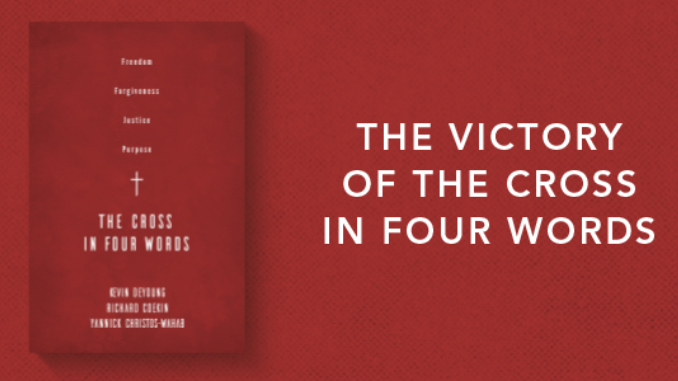
Also by this author: Impossible Christianity: Why Following Jesus Does Not Mean You Have to Change the World, Be an Expert in Everything, Accept Spiritual Failure, and Feel Miserable Pretty Much All the Time, Faith for Life: Inspiration from the Ordinary Heroes of Hebrews 11
on June 1, 2020
Genres: Non-Fiction, Theology
Buy on Amazon
Goodreads

Freedom, forgiveness, justice, and purpose. We long for them in our lives and in the world. The cross delivers them!
Yet sometimes we are so familiar with the cross that it loses its impact on us. We forget that Jesus' death on the cross and his resurrection are the most important events in human history and our lives. The cross is the fulfillment of God's salvation plan, promised from the dawn of time. It is central to the Bible, central to our faith, and central to the meaning and purpose of our lives.
This foundational book by Kevin DeYoung, Richard Coekin, and Yannick Christos-Wahab looks at passages from both the Old and New Testaments to sum up the victory of the cross in four words-freedom, forgiveness, justice, and purpose-and what that means for us personally.
Marvel at the cross afresh and be moved to love and serve the Lord Jesus with renewed zeal and joy.
This short yet profound book is a very useful discipleship tool. It can be read individually, in pairs, or in small groups.
The Cross in Four Words is a simple, compact volume of just 91 pages meant to introduce readers to the core of the Gospel message. Kevin DeYoung, Richard Coekin, and Yannick Christie-Wahab come together for four essays that take readers to the heart of the cross.
Freedom
The first essay, written by DeYoung, is about redemption. The cross brings freedom. DeYoung spends most of his time talking about the Passover in the Exodus and how it symbolizes the movement from the Israelites from slavery to freedom. In the same way, Christ, out Passover Lamb, moves us from slavery to sin to freedom in Christ. Some of the best points in this essay is how we are freed to worship and how our redemption is meant to change our very identities
Forgiveness | The Cross in Four Words
The second essay, written by Christos-Wahab, focuses on forgiveness. Using the Old Testament Day of Atonement, Christos-Wahab shows readers how Christ fulfills this important ritual. If you’re not aware of this ritual, this will by far be your favorite part of the book. Christos-Wahab is clear that the bloody atonement and ritual of the Day of Atonement is meant to make us uncomfortable. It reminds us that salvation did not come without sacrifice. It’s a clear and powerful picture of Christ’s salvation on the cross.
Justice
The third essay, written by DeYoung, covers God’s justification of the guilty. I especially appreciated DeYoung’s illustration of the two ways we tend to view sin. He mentions President Trump’s insistence that he has never asked God for forgiveness—an indication that sin isn’t his problem. And then he contrasts that with Obama’s assertion that sin is whatever is a transgression of my personal values—that is, sin is what I define it to be. Obama may have been speaking in a more secular or ecumenical sense, but the overall point is still made: we tend to view sin as someone else’s problem or only our problem. But sin is communal. It affects the community. And God is the standard for determining sin, not us.
Purpose | The Cross in Four Words
The final essay, focusing on purpose, is written by Coekin. This is a natural choice to close out the book, as it gives us a call to action. The cross gives us purpose and directs our mission. His three points: be willing to serve, be willing to suffer, and invest in eternity.
Conclusion
The Cross in Four Words will most appeal to churches wanting to give new believers or seekers introductory material on the Gospel message. The message is clear, foundational, and Gospel. Like all material from The Good Book, it comes from a conservative and Reformed perspective. I found it interesting that, ostensibly about the Cross, the book actually focused more on Jesus as the fulfillment of Old Testament rituals such as Passover and the Day of Atonement, or prophecy, such as Isaiah 53. I’m fine with that. I believe that most Christians need a better knowledge of how Jesus Christ connects to the Jewish faith, but it isn’t what I was expecting based on the title. Overall, The Cross in Four Words is a pretty standard introduction to the major concepts of salvation.
